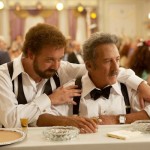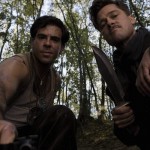The Last Station Review
“The Last Station†sounded like it would be a fascinating experience. It tells the story of the final years of one of the greatest writers in history—Leo Tolstoy—while examining whether one can believe in an ideology while not following it religiously. It’s a relevant subject, and with Oscar-nominated performances from Helen Mirren and Christopher Plummer (plus a promising supporting cast including Paul Giamatti and James McAvoy), the film should’ve been great. It’s not. In fact, until the final 20 minutes, there’s very little to get excited about. I suppose it looks nice, but there’s no focus, and the great performances simply consist of Plummer and Mirren screaming at each other. But something happens at the end that’s unexpected. The film gets to you. I spent most of it wondering why these two individuals stayed married for 48 years, when it seems so clear that they are on different pages, but in those final minutes, you see love, and it’s beautiful—just not quite beautiful enough to earn a solid recommendation.
You know Tolstoy, even if you haven’t read him. He’s the author of such classics as “War and Peace†and “Anna Karenina,†and he was a hero of pre-revolutionary Russia. Here, he’s old and he knows he’s not much longer for this world, and those around him are circling like vultures to claim the rights to his work. His closest associate is Vladimir (Giamatti), and he wants his hero’s work to belong to the people of Russia. This is more than unsettling to Tolstoy’s fiercely combative wife, Countess Sofya (Mirren), who simply wants what’s promised her as his wife. The two are pitted against each other, with Valentin (McAvoy) caught in the middle. He’s hired by Vladimir to keep an eye on the Countess, but he takes a liking to her when she encourages him to follow his heart toward Masha (Kerry Condon), another Tolstoy disciple.
The problem is that the film can’t decide what it wants to be about. I didn’t even know who the main character was (I could see where all the Oscar category confusion came from). The story is Tolstoy’s, but Sofya is the most dynamic character and drives the story forward. Yet, it felt like director Michael Hoffman wanted the focus to be on Valentin (he interacts with everyone the most, and he has his own subplot–the on-again-off-again romance with Masha). If so, it was a mistake. He’s not a remotely interesting character, and McAvoy, while talented, is severely overmatched by his more experienced co-stars. Plus, he and Kerry Condon have very little chemistry, making their romance very tepid.
The other romance is more developed, but for most of the film, it’s unpleasant. Tolstoy and the Countess are supposed to have this kind of eternal, enduring love, but they just shout all the time—and it’s all over money, which seems somewhat trivial for people in their position. There’s one heartwarming scene where we see them actually enjoying each other’s company (pictured above), as well as the conclusion, which I mentioned was fantastic.
I thought the performances from Mirren and Plummer were solid for sure. Were they award-worthy? No, but I can see why the Academy embraced their work. Mirren plays the suffering wife role, which the Academy just loves. She is overbearing and a little crazy, but she comes across as a victim, which makes her likeable (or at least pitiable). Plummer, on the other hand, is one of the most overdue actors in Hollywood. After all, he gave us Captain Von Trapp in “The Sounds of Music.†Here, he’s playing a real person (another Academy favorite) who is torn between his philosophy and his wife. In theory, they cannot exist in the same realm (his philosophy forbids physical love, while Sofya abhors Tolstoyism and its fanatic followers), but Leo doesn’t seem to care. As the film progresses, however, the demands of his followers (especially Vladimir) to spurn his wife and become a true Tolstoyan himself reach a tipping point. Watching it get to that point is one of the film’s successes.
“The Last Station†nails some elements, albeit minor ones. The costumes are superb and the set direction is splendid. Its problems are in the big things. The writing is all over the place (hence the poor focus) and the supporting characters (Valentin, Vladimir, and Tolstoy’s loyal daughter Sasha, to name a few) are inadequately developed. When a film fumbles so many important elements, it’s hard to be too enthusiastic about it.

















